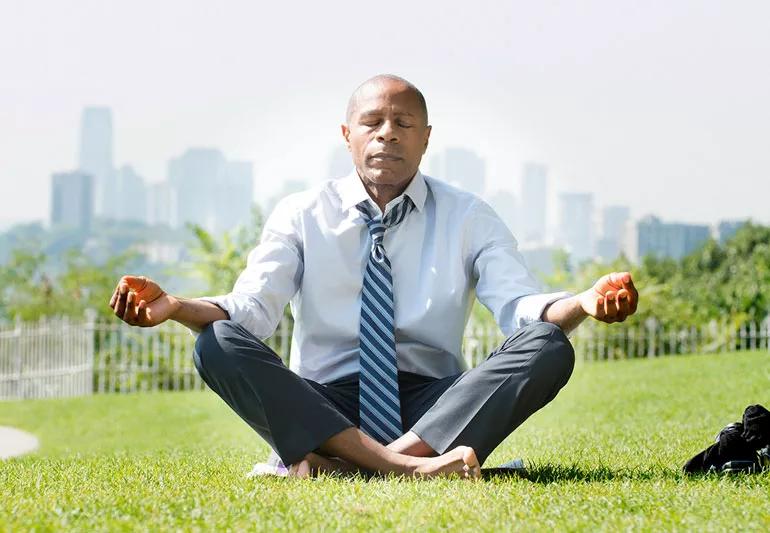And how to make healthy lifestyle habits permanent

Image content: This image is available to view online.
View image online (https://assets.clevelandclinic.org/transform/5489716f-4159-48d9-98fe-8ac338bdc24d/manMeditate-557476013-770x533-1_jpg)
man meditating in the middle of a business day
From social media influencers to great aunt Bess, everyone has an opinions about the best habits for a healthy lifestyle. But whether you’ve gone all-in on apple cider vinegar or think the latest health fads are all hype, the choices you make can have long-term health consequences.
Advertisement
Cleveland Clinic is a non-profit academic medical center. Advertising on our site helps support our mission. We do not endorse non-Cleveland Clinic products or services. Policy
“Healthy lifestyle habits can slow or even reverse the damage from high cholesterol or high blood sugar,” says lifestyle medicine specialist Mladen Golubic, MD, PhD. “You can reverse diabetes, obesity, hypertension, high cholesterol and heart disease.”
Here, he sifts through the noise to help you choose the best lifestyle habits to prevent chronic diseases.
The leading causes of death worldwide are chronic diseases, Dr. Golubic says. And they include the usual suspects:
But you can prevent many of these chronic conditions by addressing their root cause: daily habits. About 80% of chronic diseases are driven by lifestyle factors such as diet and exercise, he says.
To prevent chronic disease, Dr. Golubic recommends adjusting your habits in these five areas:
His advice is straightforward: Eat plants that are whole, unrefined and minimally processed. Eating plant-based foods helps reduce diabetes, heart disease and cancer risk.
There is evidence that the Mediterranean diet can reduce the risk of developing cardiovascular disease and other chronic diseases. This diet is rich in vegetables, fruits, legumes, whole grains fish, olive oil and nuts.
Advertisement
Other evidence suggests that consuming a fully plant-based diet can even reverse chronic, diet-related conditions, including advanced heart disease. This diet eliminates meat, dairy and eggs and includes whole foods such as vegetables, whole grains, legumes and fruits. It is the most compassionate and the most sustainable diet, Dr. Golubic says, and the one he recommends most.
“I suggest you experiment. You don’t have to go fully vegan tomorrow,” he says.
“Avoid refined and processed plant foods. Start by preparing one new plant-based meal a week.”
Moving helps all your body’s systems. Experts recommend 150 minutes of moderate-intensity activity each week.
If that seems daunting, Dr. Golubic recommends starting small. “Most of us can walk. So start with a 10-minute walk. Repeat this two or three times a day,” he says. “Then try to walk faster, have a minute of more intense walking or climb a flight of stairs. If walking is not an option, any physical activity will do. Simply move more and sit less.”
Shoot for seven to nine hours of restful sleep each night. But if you just can’t help burning the midnight oil, try to:
Chronic stress is not your immune system’s friend. Try mindfulness, meditation and gratitude to relieve stress and improve your physical and mental health.
“We tend to self-medicate with food, but there are healthier ways to relieve our stress, worries and concerns,” Dr. Golubic says.
Mindfulness: Mindfulness is the state of being more present and aware of what you sense, feel and experience. It’s a great way to cope with stress and relax.
Dr. Golubic suggests two ways to master mindfulness:
Advertisement
Meditation: If you’re new to the practice, 4×4 breathing, or box breathing, is a great place to start. Here’s how it works:
Do this for five minutes three times a week, building up to 20 minutes a day.
Gratitude: Practicing gratitude is a good antidote for stress as well. In studies, burned-out healthcare workers who performed acts of gratitude — such as remembering three good things or writing gratitude letters — reported positive effects on their well-being after a few weeks.
“Throughout our days we tend to notice more things that are not going well and pay little attention to positive moments,” Dr. Golubic says. “We are likely to feel better when, in the midst of a hectic day, we recognize and remind ourselves about all the gifts we have in life.”
Social connectedness, or loving people, keeps you emotionally and physically healthy. Even when physical distancing is the norm, virtual connections can be transformative.
Advertisement
“We have tremendous access to technology to help us avoid social isolation,” Dr. Golubic says. “Almost everybody has a cell phone, so you can be in touch with people and tell them how you feel about them. Even work emails signed, ‘I hope you’re OK,’ or, ‘stay well,’ make a difference.”
There are a few reasons it can be hard to get a handle on our habits, including:
Advertisement
To make healthy habits stick, Dr. Golubic suggests you:

Delivered every Tuesday!
Sign up for our Health Essentials emails for expert guidance on nutrition, fitness, sleep, skin care and more
It's a letter about the news!

Every two weeks once
Sign up for our Health Essentials emails for expert guidance on nutrition, fitness, sleep, skin care and more.
Learn more about our editorial process.
Advertisement
Bleeding is a risk and warrants taking care, but the reward of this lifesaving medication is great
Severe and debilitating headaches can affect the quality of your child’s life
With repeat injections over time, you may be able to slow the development of new wrinkles
Although it can be alarming, it’s normal to experience blood clots during menstruation
Stretch before heading outside, keep proper form and avoid jerking or twisting to throw snow
Type 2 diabetes isn’t inevitable with these dietary changes
Applying a hot or cold compress can help with pain
Pump up your iron intake with foods like tuna, tofu and turkey